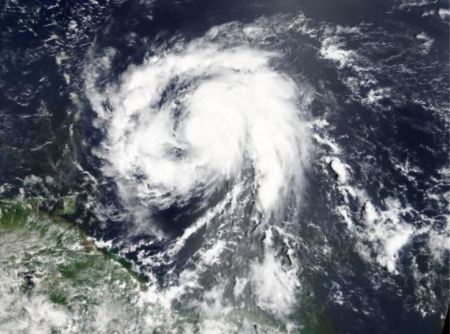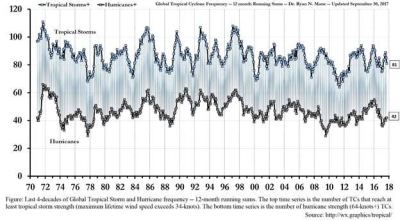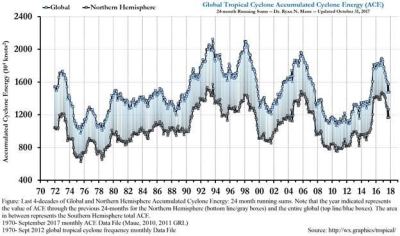Climate Change and the Christian Faith

Professor Katharine Hayhoe spoke on "Climate and Faith in the Public Arena" in her John Stott London Lecture November 16. Like Dr. Hayhoe, I'm a climate scientist; like her, I'm a Christian; like her, I care about my neighbors and want to protect them from harm; and like her, and I'm committed to stewardship of God's wonderful creation.
Nonetheless, for these very reasons I cannot help questioning some of what she has said about climate change.
In announcing the lecture, A Rocha International's Reverend Dave Bookless said, "Climate change is constantly in the global news, with increasingly extreme weather events displacing communities and causing destruction." Those words reflect Dr. Hayhoe's.

In the wake of Hurricanes Harvey and Irma, Dr. Hayhoe stated on CNN's GPS with Fareed Zakaria that "climate change is amping up heat waves, wildfires, droughts, and hurricanes" and that we should expect to see more intense hurricanes like Harvey and Irma.

The 2017 Atlantic hurricane season has indeed been very active, with six major hurricanes — two making landfall in the United States — but contrary to common claims, it was far from unprecedented.
Indeed, extreme climate events are becoming neither more intense nor more frequent. Diagnostic tools that chart the frequency and intensity of tropical cyclones globally and regionally — such as their number and the energy associated with them — show a cyclic pattern to hurricane activity but no long-term trend.
When Hurricane Harvey made landfall near Houston, it ended a record 4,323 days without a major hurricane (category 3–5) landfall in the United States. Fourteen category 4 or 5 hurricanes made landfall in the United States in the 44-year period between 1926 and 1969, but only four in the 48 years since.
Contrary to Dr. Hayhoe's implicit assumption that rising global average temperature causes more and stronger hurricanes, colder periods in the historical climate record for New England and South Carolina show more frequent hurricane landfalls.
And while the North Atlantic basin was active this year, premier weathercaster Joe Bastardi of WeatherBell Analytics commented that he could not remember seeing the North Pacific without any tropical cyclone activity in the height of the hurricane (typhoon) season (i.e., mid-September), as it was this year.
In short, no upward trend currently exists in the climate record of hurricane activity in either frequency or intensity.
Dr. Hayhoe's solution to this non-problem is a "fast transition" from carbon-based energy sources to "clean energy." The added benefit, she argues, is that "burning fossil fuels — coal, gas, and oil — is responsible for over 200,000 deaths in the United States alone every year."
If true, this would make fossil fuel burning America's third largest cause of death, behind heart disease and cancer. But there are problems with that.
First, to argue this statistic, climate alarmists usually cite that chronic respiratory diseases lead to about 150,000 deaths annually. However, cigarette smoking explains about 80% of those deaths, and environmental factors and genetic predisposition cannot be ignored. Thus, blaming 200,000 annual deaths on fossil fuels is misleading.
Second, deaths from chronic respiratory diseases are related not to temperature — regardless whether that's controlled in part by carbon dioxide emissions — but to other emissions from fossil fuel use, primarily particulate matter, which we can control without controlling carbon dioxide emissions (which don't harm health but do improve crop yields worldwide). Even if reducing fossil fuel use would significantly reduce global warming — which is highly unlikely — the temperature reduction would have no impact on mortality from respiratory diseases.
Third, Dr. Hayhoe's claim is one sided. If we're to talk about fossil fuels' effects on health and mortality, we must consider not only how they contribute to disease but also how they contribute to health and life. That they provide over 80 percent of all the energy used to produce food, clothing, shelter, transportation, health care, and everything else that supports health and life suggests that they do far more good than harm.
And fourth, so-called "clean energy" sources — wind and solar — require environmentally degrading mining practices. Wind turbines and hybrid cars require large quantities of neodymium and dysprosium for their magnets, and solar panels utilize rare metals such as indium and tellurium. Mine workers face highly toxic and dangerous working conditions, usually for low pay and often with child labor exploitation. Wastewater from the mines contaminates soil and groundwater, and the required process of strip mining involves significant environmental degradation. These "clean energy" sources are anything but clean.
The long-term impact of eschewing fossil fuels will be to make energy and everything that depends on it more expensive. Transportation costs will skyrocket, making it more expensive to travel to work and to transport goods. Raising food will be more costly. Heating and cooling will become so expensive that many will have to choose between food and heat. To raise energy's price is to make living more difficult for all but the richest citizens.
Nonetheless, many environmentalists, including some Christians, prescribe "solutions" to global warming that will keep inexpensive energy from the poor in developing nations.
But the poor cannot be good stewards of their environment if they lack food, clothing, shelter, or security. Inexpensive energy can provide the simple amenities necessary to lift them from abject poverty. Refrigeration allows food to last longer. Cooking becomes cleaner when people don't have to burn dung indoors. Sanitation and water treatment can provide clean drinking water and prevent disease. But all of these depend on abundant, affordable, reliable energy — the kind fossil fuels provide better than wind and solar.
Shouldn't we, as Christians, heed the call of our Savior and protect the least of our brethren? Shouldn't we resist the call to end fossil fuel use and substitute more expensive, less reliable energy sources? Particularly since such efforts would have little, if any, impact on our climate, since the impact of CO2 on hurricanes, floods, droughts and other natural disasters is, like its impact on temperature, grossly overstated, this would seem wise.
We certainly wish to be good stewards of our environment. We should strive for energy conservation and to search out alternative forms of inexpensive energy. But the notion that we need a "fast transition" from fossil fuels to so-called clean energy to protect us from climate change and "save the planet" is a recipe for personal and economic disaster.
Concerned Christians need to investigate the true science of climate change, resist exaggeration, and grasp the role of inexpensive energy in overcoming poverty. They will find a study published by the Cornwall Alliance for the Stewardship of Creation, a group of theologians, scientists, and economists concerned about both the plight of the poor and wise earth stewardship, a good start.





















